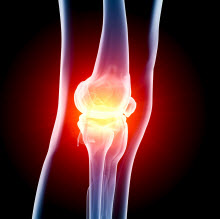
Almost every day of my career, at least one patient who came in to see me said, “Oh boy, am I stiff. I just dread getting out of bed in the morning.” Waking up with painful joints and other everyday aches and pains is one of the many signs of aging. At least 80 percent of people older than 50 experience some painful joints, which can interfere with everyday activities—whether it’s walking the dog or playing with the grandchildren.
But while the lifestyle aspect of painful joints concerns me greatly, as a cardiologist I can also tell you that joint pain isn’t good for the cardiovascular system. That’s because joint pain is usually accompanied by inflammation, and as you know keeping inflammation down is important for heart health. Also painful joints can jack up your autonomic nervous system—affecting your heart rate, anxiety and blood pressure.
What Can You Do About Painful Joints?
First off, I recommend taking a combination of turmeric and omega-3s which help to suppress the fires of inflammation. That’s a combination I take myself because I have painful joints as a result of participating in high school and college athletics. Plus, I’ve added a third nutrient to the mix called UC-II®, which has been getting a lot of research attention lately for good reason—it helps to relieve joint pain.
UC-II is a special, patented form of undenatured type II collagen. It works by deactivating collagen-specific T cells, which are the cells that release enzymes that break down collagen.
But what really impressed me was the research showing UC-II is more effective than glucosamine and chondroitin for reducing joint pain.
In a study published in the International Journal of Medical Sciences, researchers studied 52 adults with painful joints. Half were given 40 mg of UC-II for 90 days, and the other half received 1,500 mg of glucosamine and 1,200 mg of chondroitin. Then, they tested their pain, physical function, and stiffness on three different scales and the UC-II group won out on pain relief and improved mobility.
I also like the fact that UC-II can help with joint pain during and after exercise. In a randomized, double-blind, placebo-controlled trial of 55 healthy people who had joint pain after strenuous exercise, those given 40 mg/d of UC-II (versus a placebo) fared far better. The UC-II group had less joint discomfort both during and after exercise. Plus, they had better flexibility and mobility.


